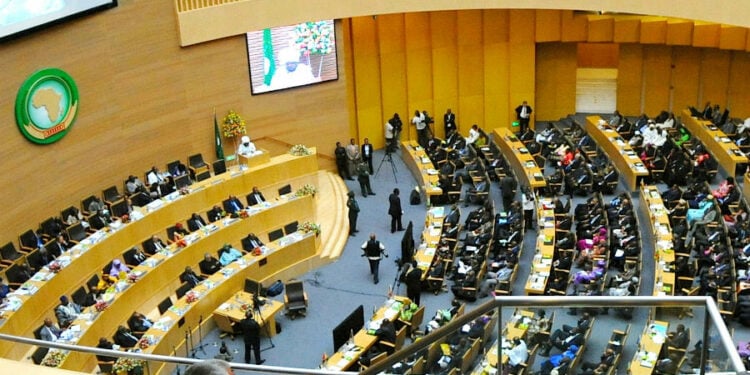The African Union Commission (AUC), in collaboration with the African First Ladies Peace Mission (AFLPM), has reaffirmed its commitment to strengthening women’s leadership in conflict prevention, mediation, and peacebuilding.
Speaking at a capacity-building program on women’s participation in conflict prevention, dialogue, and preventive diplomacy yesterday in Abuja, the African Union Commissioner for Political Affairs, Peace, and Security, Amb Bankole Adeoye, represented by Nadia Roguiai, emphasised the urgent need to address the persistent underrepresentation of women in peace processes.
Amb Adeoye highlighted the transformative role of women in mediation and preventive diplomacy, noting that inclusive peace processes are more sustainable and effective. Despite their significant contributions, women are disproportionately underrepresented globally as mediators and negotiators.
He expressed deep appreciation to Mrs Fatoumata Bah Barrow, First Lady of The Gambia and President of AFLPM; Madame Fatima Vila Nova, First Lady of São Tomé and Príncipe and AFLPM Vice President; Mrs Aisha Buhari, Former First Lady of Nigeria and Chairperson of the Honorary Advisory Council; and Dr Jewel Howard-Taylor, former Vice President of Liberia and Secretary-General of AFLPM, for their steadfast leadership in championing women’s empowerment in peace and security.
“Resolution 1325 is not just a document but a call to action. Women’s inclusion is a fundamental prerequisite for sustainable peace,” he said, referencing the 25th anniversary of United Nations Security Council Resolution 1325 in 2025.
He added that the African Union’s partnership with AFLPM, formalised through a Memorandum of Understanding (MoU) signed in Abuja in May 2023, reinforces their collective resolve to elevate women’s critical roles in conflict prevention and resolution across Africa.
For her part, Hon. Veronica Sesay, President of ECOFEPA, represented by Hon. Maimuna Ceesay, stressed the importance of addressing the root causes of conflict, such as poverty, inequality, and political instability, through vigilant conflict prevention efforts.
She underscored the centrality of dialogue and preventive diplomacy as tools for building trust, promoting understanding, and resolving disputes before they escalate into violence.
Hon. Sesay urged regional bodies like ECOWAS, the African Union, and the United Nations to provide platforms for mediation and negotiation while emphasising the role of technology, regional cooperation, and women and youth empowerment in advancing peace initiatives.
“By working together, we can build bridges of understanding and secure a brighter, peaceful future for all Africans,” she said.
Similarly, the head of communication at AFLPM, Jerrilyn Mulbah, said the capacity-building program has brought together key stakeholders, including women parliamentarians from West Africa, representatives from Borno State Civil Society Organizations (CSOs), and members of the Borno State government.
Mulbah emphasised AFLPM’s historical commitment to fostering peace since its founding during the 1995 Beijing World Conference by Africa’s First Ladies, led by Nigeria’s former First Lady, Dr Mariam Abacha.
Addressing current global and domestic conflicts, Mulbah cited challenges in Gaza, Sudan, and Borno State, highlighting the urgent need to empower women leaders with the skills and tools to drive dialogue and preventive diplomacy.
“Conflict is inevitable, but empowering women ensures that they can actively build peace within their communities and beyond,” she said.
The training participants shared personal stories of challenges faced within their communities and political spaces, underscoring the program’s role in preparing women to take on leadership roles and drive sustainable peacebuilding efforts.
“This training is not just a platform for engagement but a tool that ensures women are actively part of the engine driving peacebuilding in Africa,” she added.



